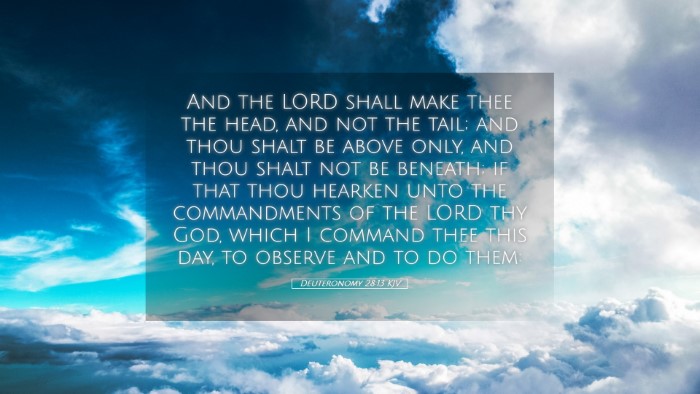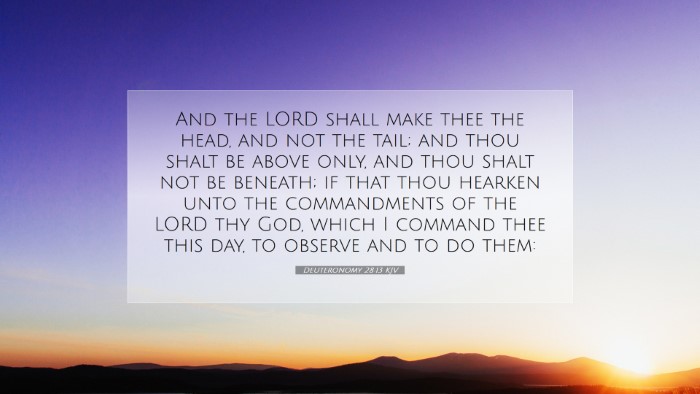Commentary on Deuteronomy 28:13
Verse Reference: Deuteronomy 28:13 - "And the LORD shall make thee the head, and not the tail; and thou shalt be above only, and thou shalt not be beneath; if that thou hearken unto the commandments of the LORD thy God, which I command thee this day, to observe and to do them."
Introduction
The verse selected, Deuteronomy 28:13, stands as a pivotal declaration within the broader context of the challenges and blessings that Israel faces upon entering the Promised Land. It succinctly encapsulates a divine promise linked to obedience and the consequences tied to the nation’s faithfulness to God’s covenant. Understanding this verse through the lens of various public domain commentaries provides a rich tapestry of insights that can serve as a beacon for pastors, students, and scholars alike.
Exegesis
This verse occurs within the context of Moses’ farewell address to the Israelites. Following a long discourse on blessings and curses for obedience and disobedience, verse 13 declares a promise of prominence and preeminence for those who heed God's commandments. The emphasis here is on the transformational power of obedience to the covenant obligations that God has established with His people.
Obedience and Status
The promise that "the LORD shall make thee the head, and not the tail" indicates a reversal of status among nations, where Israel is placed in a position of leadership rather than subjugation. Matthew Henry remarks that this phrase signifies not merely a physical or political elevation but also a spiritual one—through adherence to the law, the nation would find itself elevated in God’s favor. The head symbolizes authority, blessing, and guidance, while the tail signifies humiliation and a place of servitude.
Conditional Promise
Albert Barnes points out the critical conditionality asserted in the latter part of the verse: "if that thou hearken unto the commandments." This underscores the premise that the promises of God are inextricably linked to human response—a recurring theme throughout the Torah. The state of being 'above only' depends on the commitment to observing and executing God's commandments. The use of the word "only" connotes a promise of exclusivity in blessing, emphasizing that Israel’s status as the favored nation is contingent on their obedience.
Theological Implications
Deuteronomy 28:13 speaks to broader theological principles, most notably the character of God as one who desires to bless His people, yet remains committed to justice and holiness.
God's Desire to Bless
This verse illustrates God’s intent to bless those who follow Him. Adam Clarke comments on the nature of divine favor, noting that often God's blessings manifest themselves in tangible forms of leadership and prosperity. This serves as a primary motivation for obedience, as adhering to God's commandments brings about favorable outcomes, contrasted against the repercussions of rebellion.
Leadership and Responsibility
In a socio-political context, the leader is charged with influencing the community. As the head, Israel is called to reflect God’s justice and mercy. Furthermore, the text calls into question contemporary understandings of leadership and authority among believers, highlighting that true leadership emerges from a foundation of obedience to God. This can be particularly pertinent for pastors and church leaders who are tasked with shepherding their congregations in ways that embody the principles highlighted in this verse.
Covenantal Relationship
The covenantal relationship between God and Israel illustrates a dynamic which remains relevant in Christian theology. The verse echoes the New Testament themes, whereby believers are recognized as part of a new covenant, thus inheriting similar blessings through faith in Christ. This continuity can motivate deeper engagement with scriptural commandments as pathways to experiencing God’s blessings.
Practical Applications
For pastors, students of the Bible, and theologians, reflecting on Deuteronomy 28:13 can yield various practical applications:
- Personal Reflection: Engage in self-assessment regarding personal obedience to God’s commands. Consider areas of life where one might feel like 'the tail' and how obedience might change that situation.
- Congregational Teaching: Utilize the verse to emphasize the importance of a covenant relationship with God. Teach on how faithfulness to the Word aligns believers with divine favor.
- Leadership Framework: In church leadership contexts, apply the principles of being 'the head' in terms of moral and spiritual guidance for congregations. Leadership should always reflect God’s nature and commands.
- Community Responsibility: Inspire acts of service and justice in the community as a reflection of the blessing that comes from obedience. The church can lead in social justice initiatives, reflecting God's light in the world.
Conclusion
Deuteronomy 28:13 serves as both a promise of hope and a call to action for those who seek to align with God’s will. It is rich with implications about leadership, the nature of divine blessings, and the significance of a faithful response to God’s commandments. The insights drawn from public domain commentaries provide a robust framework for understanding this verse’s place within the broader narrative of Scripture. For pastors, students, and scholars, this verse offers profound implications that extend beyond ancient Israel, calling forth a reflective citizenship within God's kingdom characterized by obedience and divine favor.


